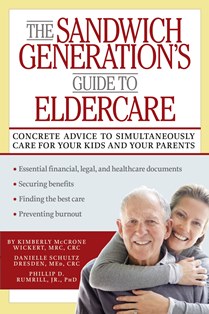 A new book co-authored by Kent State University researcher Phillip D. Rumrill Jr., Ph.D., advises the “sandwich generation” of adults who care for both children and aging family members on how to manage stress, avoid burnout and find resources for help.
A new book co-authored by Kent State University researcher Phillip D. Rumrill Jr., Ph.D., advises the “sandwich generation” of adults who care for both children and aging family members on how to manage stress, avoid burnout and find resources for help.
“The Sandwich Generation’s Guide to Eldercare” (DemosHealth, New York) reflects both what he has learned in years of research and rehabilitation counseling and his personal experience of simultaneously caring for children and an elderly grandparent, said Rumrill, professor and director of the Center for Disability Studies at Kent State.
Rumrill, an expert on rehabilitation and a widely published researcher, managed the financial and medical affairs of his grandmother, who battled cancer and Alzheimer’s disease before she died at age 84 in 2009.
“I often wished that I had a how-to book or some other resource to guide me in helping my grandmother at her most vulnerable time,” he said.
The co-authors, Kimberly McCrone Wickert and Danielle Schultz Dresden, both rehabilitation and disability specialists, faced similar situations of caring for elderly loved ones while juggling parenting responsibilities and careers. Dresden is a 1999 graduate of Kent State’s master of education degree program in rehabilitation counseling, and Wickert received her B.S. in speech pathology and audiology from Kent State in 1990. She earned a master’s in rehabilitation counseling from Wright State University in 1992.
The three decided to write the book, “drawing on our professional experience as case managers and rehabilitation professionals as well as our personal experiences,” Rumrill said.
“Over the next 20 to 40 years, there will be more elderly Americans than at any other point in history, and current trends suggest that the elderly will be more reliant on financial support from their families than ever before,” the authors wrote.
The number of Americans over the age of 65 is expected to double by 2030, and the ranks of people 90 and older may reach nine million by 2050, according to U.S. Census figures.
The “sandwich generation” of adults between the ages of about 40 and 60 who are raising children at the same time that they care for parents and grandparents (one out of eight Americans, according to the Pew Research Center) face daunting decisions about finances, available services, Medicare and long-term care options, Rumrill noted.
The book offers advice on financial and healthcare issues, in-home care versus nursing facilities, how to deal with stress and burnout, resources for coping with Alzheimer’s disease and dementia, and how to advocate for loved ones.
Honesty in communicating with an elderly family member is essential, the authors note, even if it creates an uncomfortable situation and even if the loved one is unable to fully participate in a decision. If a conversation is going to be difficult, the authors suggest scripting it and practicing it with a friend.
They also explain:
- How to create eldercare, estate, healthcare, estate and financial plans
- Provisions of the new Affordable Care Act that affect the elderly and recent changes in Medicare
- Checklists for interviewing a geriatric medical specialist, an elder law attorney and a home healthcare provider
- What to look for in a care facility, whether assisted living, skilled nursing care or a hospice program is needed, and how to compare facilities
To address caregiver burnout, the authors recommend finding a support group, enlisting friends and family, allocating tasks and not expecting perfection.
“There is no reason to expect that you should be prepared from the outset to help your elderly loved one make decisions about his or her care – you haven’t done this before,” the authors point out.
Rumrill is the author or co-author of 170 professional journal articles, 11 books and numerous book chapters and manuals. He recently was awarded a $2.3 million, five-year grant from the U.S. Department of Education to develop a pilot program to prepare young adults with traumatic brain injuries for the job market. In 2005, he was named Rehabilitation Researcher of the Year by the National Council on Rehabilitation Education, and in 2010, he received the Kent State University Distinguished Scholar Award.
For more information about research at Kent State, visit www.kent.edu/research.
# # #
Media Contacts:
Cindy Weiss, lweiss4@kent.edu, 330-672-0731
Phillip D. Rumrill Jr., prumrill@kent.edu, 330-672-2294
Emily Vincent, evincen2@kent.edu, 330-672-8595
